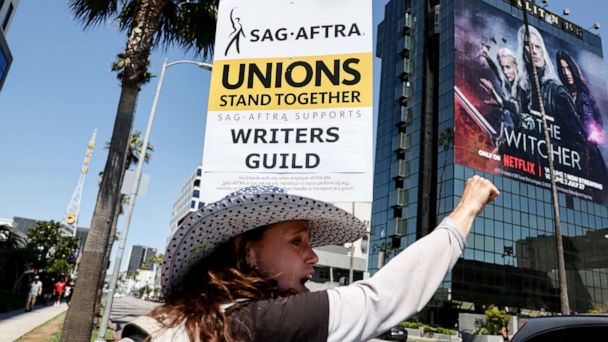Actors working in Hollywood have joined writers who’ve been on strike from May, by striking work themselves. The Screen Actors Guild – American Federation of Television and Radio Artists (SAG-AFTRA) struck work from July 12 midnight after negotiations with the Alliance of Motion Picture and Television Producers (AMPTP) failed. This means, all film and television productions have come to an immediate halt, essentially shutting down Hollywood.
Members of SAG-AFTRA have joined up with more than 11,000 already striking film and TV writers. The SAG-AFTRA union announced that it had agreed to a last-minute request by the AMPTP for federal mediation, but it refused to again extend its existing labour contract past the July 12 11.59 p.m. negotiating deadline, in Los Angeles. This is the first tandem strike in the industry since 1960.
Oppenheimer actors left the film’s London premiere on July 13 due to the strike. The film will open next week. Actors will not be able to even promote past projects, including Emmy Awards campaigning, during the strike. Nominations for the Emmy Awards show were announced on July 12. The Awards will take place on September 18.
Hollywood actors are fighting for higher wages, better working conditions, and health and pension benefits, as well as guardrails for the use of Artificial Intelligence in future film and TV productions. The SAG-AFTRA is also seeking more transparency from streaming platforms about viewership so that residual payments can be aligned with that in the television industry.
The Writers Guild of America, on strike since May this year, is seeking higher fees and residuals, particularly for streaming shows, as well as new rules which will require studios to hire a certain number of writers for a specific period in the case of TV shows. The WGA is also asking for compensation throughout the process of pre-production, production and post-production. Currently, writers are often expected to provide revisions or write new material without payment. The WGA is also concerned about the use of Artificial Intelligence in the sphere of script writing.
While the SAG-AFTRA said, producers have been working to delay negotiations, the AMPTP said, it had “presented a deal that offered historic pay and residual increases, substantially higher caps on pension and health contributions, audition protections, shortened series option periods, and a groundbreaking AI proposal that protects actors’ digital likenesses”. It blamed SAG-AFTRA for stalled talks.
Reacting to the AMPTP statement, Duncan Crabtree-Ireland, national executive director and chief negotiator for SAG-AFTRA remarked, “In that groundbreaking AI proposal, they proposed that our background performers should be able to be scanned, get paid for one day, and their company should own that scan, their image, their likeness, and should be able to use it for the rest of eternity in any project they want, with no consent and no compensation. So if you think, that’s a groundbreaking proposal, I suggest, you think again.” Fran Drescher, president of the SAG-AFTRA, called the AMPTP members “crazy” and called their response to the actors’ proposals “insulting”.






























